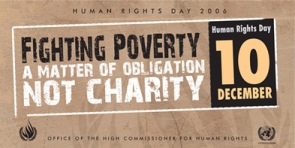Message of the Office of the United Nations High Commissioner for Human Rights
Fighting Poverty: a matter of obligation, not charity
Poverty is a cause and a product of human rights violations. It is this double edge that makes poverty probably the gravest human rights challenge in the world. The links between human rights and poverty should be obvious: People whose rights are denied -- victims of discrimination or persecution, for example -- are more likely to be poor. Generally they find it harder or impossible to participate in the labour market and have little or no access to basic services and resources. Meanwhile, the poor in many societies cannot enjoy their rights to education, health and housing simply because they cannot afford them. And poverty affects all human rights: for example, low income can prevent people from accessing education -- an “economic and social” right -- which in turn inhibits their participation in public life -- a “civil and political” right -- and their ability to influence policies affecting them.
Yet, poverty is still rarely seen through the lens of human rights. Rather it is often perceived as tragic but inevitable, and even as the responsibility of those who suffer it. At best those living in poverty -- countries and individuals -- are portrayed as unfortunate, at worst as lazy and undeserving.
The reality is different. Many ingredients go into making poverty, but factors like discrimination, unequal access to resources, and social and cultural stigmatization have always characterized it. These “factors” have another name: the denial of human rights and human dignity. What’s more, these are factors governments and those in a position of authority can, indeed are obliged to, do something about. They have committed to it by overwhelmingly accepting a number of human rights treaties and by signing on to the international consensus to make poverty history, through the Millennium Declaration and the Millennium Development Goals, as well as most recently the 2005 World Summit Outcome. The realization of human rights – including the fight against poverty -- is a duty, not a mere aspiration.

